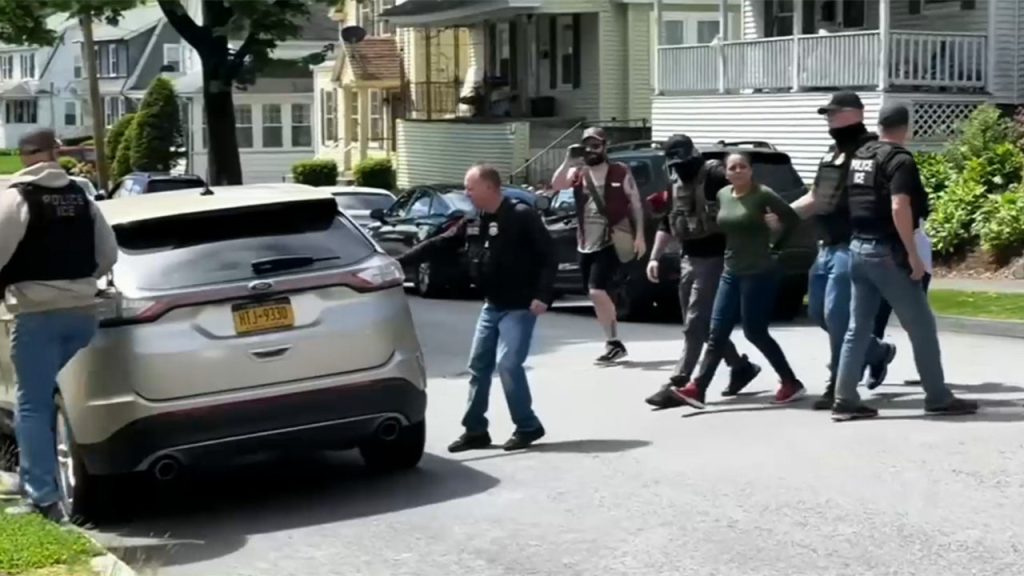The U.S. Attorney for the District of Massachusetts, Leah Foley, has issued a strong statement condemning recent interference with Immigration and Customs Enforcement (ICE) operations in the state. Her remarks follow a chaotic incident in Worcester, where a crowd disrupted an ICE arrest, prompting concerns for public safety. Foley emphasized the gravity of these actions, warning that any obstruction of federal law enforcement would not be tolerated and may lead to criminal charges.
| Article Subheadings |
|---|
| 1) Overview of Recent Events in Worcester |
| 2) Implications of ICE Operations |
| 3) Federal Response and Statements |
| 4) Public Reaction to ICE Arrests |
| 5) Future of Immigration Enforcement in Massachusetts |
Overview of Recent Events in Worcester
The incident in Worcester unfolded during a recent ICE operation that led to the arrest of Ferreira de Oliveira, identified by officials as a “violent criminal alien.” The altercation began when around 25 onlookers gathered to protest the arrest. Officials described the situation as chaotic, with local law enforcement required to intervene to regain control. The protest included chants urging ICE not to take the individual and demanding to see a warrant for the arrest.
The events occurred on May 8, when ICE agents, collaborating with local police, attempted to apprehend de Oliveira. The operation quickly attracted attention, resulting in a vocal crowd, which raised concerns about the conduct of local citizens in the face of federal law enforcement actions. This incident has sparked widespread discussion around the implications of public protests against ICE operations.
Implications of ICE Operations
The recent disturbances in Worcester highlight the friction between ICE’s enforcement actions and public sentiment in Massachusetts, a state that has seen significant activism around immigration issues. According to federal and local authorities, proper procedures were followed during the arrest, and the primary goal was public safety.
ICE’s operations are designed to enforce immigration laws and address potential criminal threats posed by individuals who have violated these laws. As noted by Homeland Security officials, the political climate and the portrayal of federal authorities can influence public opinion and responses in situations of law enforcement. The chaotic protests raised questions about how these authorities can operate effectively while facing opposition from local communities that may have differing views on immigration practices.
Federal Response and Statements
In response to the Worcester incident, Leah Foley articulated her disapproval of the public interference, stressing that such actions pose risks not only to ICE officers but also to the general public. During a press statement, she indicated her zero-tolerance stance towards any behavior that obstructs federal law enforcement, stating,
“The interference with ICE operations around Massachusetts has been disturbing, to say the least. This conduct poses significant public and officer safety risks.”
Moreover, Foley reaffirmed the commitment of the United States Attorney’s Office to investigate any violations of federal law arising from such activities. She noted, “I will not stand idly by if any public official, public safety officer, organization or private citizen acts in a manner that criminally obstructs or impedes ICE operations.”
Public Reaction to ICE Arrests
The public reaction to the arrest and the subsequent protests has been mixed, illustrating a divide in public opinion on immigration enforcement. Supporters of ICE argue that these operations are necessary for public safety, while critics contend that they create an atmosphere of fear and hostility within immigrant communities.
During the protest, onlookers expressed their concerns vocally, chanting phrases such as “no warrant!” and “don’t take the mother!” These reactions indicate a growing movement among some citizens who feel compelled to stand against what they perceive as aggressive immigration enforcement tactics. Critics argue that these tactics disproportionately affect families and vulnerable communities.
Future of Immigration Enforcement in Massachusetts
Looking ahead, the future of immigration enforcement in Massachusetts may hinge on the ongoing public discourse between ICE, local officials, and community activists. Based on past patterns, Massachusetts may continue to see a rise in activism aimed at opposing federal immigration law enforcement methods.
The dynamics between federal and local law enforcement agencies could also be influenced by newly elected officials who may have differing perspectives on immigration policies. The current administration’s stance emphasizes a collaborative approach, which will be tested in light of such recent confrontations. The balance between enforcing immigration laws and respecting community sentiments remains a key focus moving forward.
| No. | Key Points |
|---|---|
| 1 | The U.S. Attorney in Massachusetts warns against obstruction of ICE operations. |
| 2 | A chaotic altercation occurred during an ICE arrest in Worcester. |
| 3 | Concerns over public safety and law enforcement were raised following the event. |
| 4 | Protests during ICE operations indicate divided public sentiment on immigration enforcement. |
| 5 | The future of immigration enforcement may depend on ongoing public discourse and local politics. |
Summary
The recent events in Worcester serve as a significant reflection of the tensions surrounding immigration enforcement in the state. As Leah Foley takes a firm stance against public obstruction of ICE operations, the implications for future law enforcement are profound. The incident underlines the challenges federal authorities face in executing their duties amid increasing public activism, growing divisions, and the potential for future confrontations.
Frequently Asked Questions
Question: What prompted the recent ICE operations in Massachusetts?
The recent ICE operations were prompted by the need to enforce immigration laws, specifically targeting individuals identified as threats to public safety, such as those with criminal records.
Question: Who is Ferreira de Oliveira?
Ferreira de Oliveira is an individual described by federal authorities as a “violent criminal alien.” She was arrested during an ICE operation in Worcester and has a history of criminal charges.
Question: What are the implications of obstructing ICE operations?
Obstructing ICE operations can lead to criminal charges for those involved. The U.S. Attorney’s Office has indicated a willingness to pursue legal action against individuals or organizations that interfere with federal law enforcement activities.
